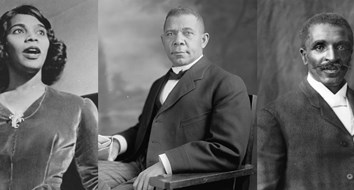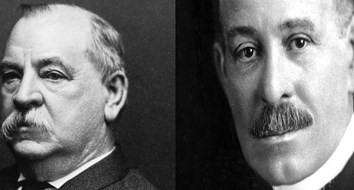Lawrence W. Reed, economist and author, is President of The Mackinac Center for Public Policy, a free market research and educational organization headquartered in Midland, Michi gan.
Economics is a subject that dominates public life and important policy discussions these days, but those Americans who rely on what they've learned of it in the public schools are entering the intellectual battle unarmed.
According to an informal survey in my state of Michigan, 72 percent of the state's high schools offer economics. But of those, 51 percent make it a required course while 49 percent offer it as an “elective.” Only a tiny fraction of students choose to take the subject when the choice is up to them. Barely 49 percent of Michigan students had actually completed one economics course before graduation in 1992.
The survey involved no value judgments regarding the kind of economics taught. Some courses deal with little more than “consumer” issues: how to balance a checkbook, how to find the best deals in the market, or how to borrow money at the lowest interest rate. Those are all useful things to know, but the mental tools and essential principles needed to analyze and evaluate the paramount issues of the day are too often missing.
Moreover, even a cursory examination of textbooks used in high school economics courses reveals a dismal level of understanding or outright bias by the text authors themselves. Students are sometimes reading, for instance, that Americans are under-taxed, that government spending creates new wealth, and that politicians are better long-term planners than private entrepreneurs. It is not uncommon for texts to portray free market competition and private property in a suspicious light while presenting government intervention with little or no critical scrutiny. It therefore may actually be a blessing rather than a curse that so few students are exposed to what passes these days in the schools as “economics.”
Stripped of bias, the study of economics is immensely important. Indeed, without it we miss an understanding of much of what makes us the unique, thinking creatures we are. Economics is the study of human action in a world of limited resources and unlimited wants—a lively topic that cannot be reduced to lifeless graphs and mind-numbing equations that occupy the pretentious planner's time.
What Economics Teaches
Economics teaches us that everything of value has a cost. It informs us that higher standards of living can only come about through greater production. It tells us that nations become wealthy not by printing money or spending it, but through capital accumulation and the creation of goods and services. It tells us that supply and demand are harmonized by the signals we call prices and that political attempts to manipulate them must produce harmful consequences.
Economics explains that good intentions are worse than worthless when they flout inexorable laws of human action. It reminds us to think of the long-term effects of what we do, not just the short-term or the flash-in-the-pan effects. It tells us a great deal about the critical role of incentives in shaping human behavior.
In short, economics is a blueprint for a free and sound economy, which is indispensable to satisfying human material needs and wants. When the subject is well understood, people learn that leaving other people alone is a far more likely path to well-being than shoving them around with political dictates.
When people have lit fie or no economic understanding, they embrace the “quick fix” and support impractical “pie-in-the-sky” solutions to problems. They may think that whatever the government gives must really be “free,” and that all it has to do to foster prosperity is to command it.
Economically illiterate people are easy prey for currency cranks who argue that manufacturing more money will make us wealthier. They may even think that trade is a bad thing, that if we shut the borders to the flow of goods our living standards will rise. They will be not only unable to identify economic snake oil, but also untrained to detect its harmful consequences.
Arguably, America's great economic problems have their roots in widespread ignorance of economic principles. When the noted economist John Maynard Keynes was asked in the late 1930s if we should be concerned about rising debt and printing press money, he reportedly responded with this flippant remark: “In the long run, we're all dead.” Today, as the late Henry Hazlitt countered, is the tomorrow that yesterday's bad economists like Keynes told us we could safely—but wrongly—ignore.
From the Clinton health care plan to financing schools and highways, Americans are being asked every day to form judgments and cast votes for programs and proposals that are largely economic in nature. It would behoove us to start talking about how we provide the missing tools we need to make those and other such decisions, so that we don't dig ourselves deeper in the muck of poor thinking and bad public policy.
Mandates Are Not the Answer
So, you say, the answer is to mandate the teaching of economics! If the schools aren't teaching the subject, well, then let's make them do it! Oh, there's that tempting but utterly counterproductive “quick fix” again—symptom, in fact, of the very illness I am describing.
Passing laws to require the teaching of economics, as some states have already done, is precisely not the answer. In public education that only politicizes the subject and guarantees that too many people who don't understand it or don't want to teach it are instructing bored youngsters who couldn't care less. The vast majority of public school teachers are decent citizens of good will and great talent, but as government employees they labor in an environment naturally hostile to the critiques of government action that sound economics inevitably produces.
The idea of government-mandated economics teaching strikes me as likely to be no more effective than government-mandated teaching of anything else. Aren't we in the midst of a national education crisis as it is, with test scores and other measures of student aptitude plummeting to disgraceful levels? Is there any reason to believe that government can teach us economics any better than it teaches us mathematics?
The remedy for America's economics knowledge deficit is really the same remedy for our general knowledge deficit: a combination of demonopolizing the education system and diligent serf-instruction.
If economics is as important as I've suggested, then a market-driven, choice-focused, performance-based, and fully accountable education system would surely do a better job of teaching it than a government monopoly that gets subsidized whether it teaches for the real world or not. Make education a product of the marketplace instead of politics and much more than just economics will be taught, and taught well.
Formal schooling, though, even in a thoroughly privatized environment, can only be part of the economics teaching equation. What we learn on our own, especially if we hope to inspire and persuade others, may be just as important. Looking back on my own economics training, I note that most of it was under the auspices of private groups like the Foundation for Economic Education and by way of publications such as The Freeman.
In any event, the relative absence of economics from America's classrooms is a problem that requires our attention. Many private efforts to solve it deserve our sup-port. But no one should be fooled into thinking that putting government in charge will resolve it. []
Editor's Note: Thanks to sharp-eyed reader John Augustine of Hastings, Minnesota, who raised a question about Dr. Reed's July 1994 column. The last sentence of the first paragraph of page 344 should have read:
“A public sector that imposes more regulations than ever on the private sector and consumes at least five times the share of national income it consumed in 1900 is stark evidence of those ideas.”





